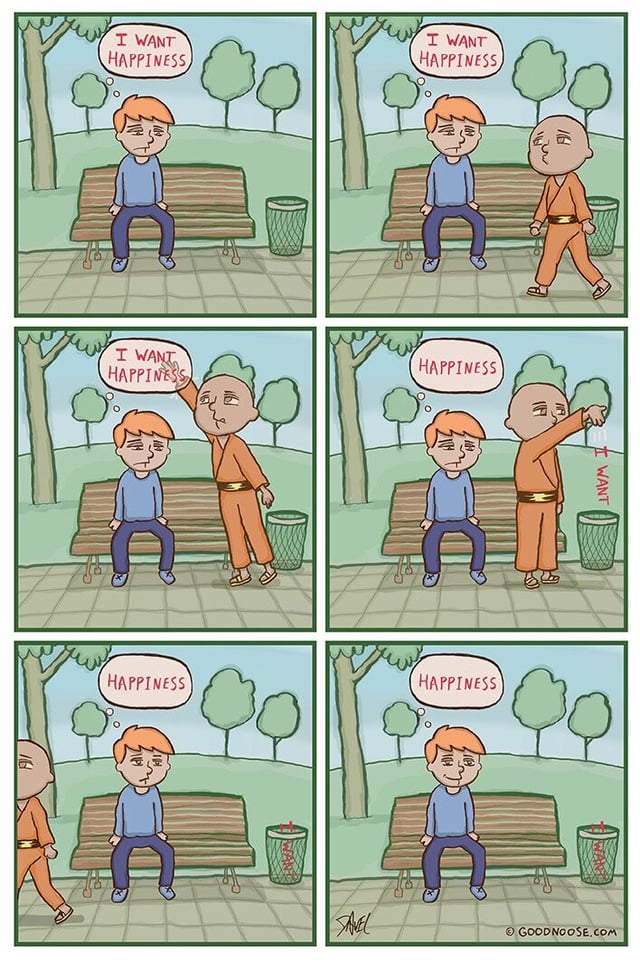Thanks, I'm cured.
Comic Strips
Comic Strips is a community for those who love comic stories.
The rules are simple:
- The post can be a single image, an image gallery, or a link to a specific comic hosted on another site (the author's website, for instance).
- The comic must be a complete story.
- If it is an external link, it must be to a specific story, not to the root of the site.
- You may post comics from others or your own.
- If you are posting a comic of your own, a maximum of one per week is allowed (I know, your comics are great, but this rule helps avoid spam).
- The comic can be in any language, but if it's not in English, OP must include an English translation in the post's 'body' field (note: you don't need to select a specific language when posting a comic).
- Politeness.
- Adult content is not allowed. This community aims to be fun for people of all ages.
Web of links
- !linuxmemes@lemmy.world: "I use Arch btw"
- !memes@lemmy.world: memes (you don't say!)
"Just stop being sad!"
If only it was that easy...
Buddhism teaches that wanting causes suffering. Happiness can be achieved when we stop wanting and start existing as we are.
The comic punchline is that by getting rid of "want" then all we are left with is happiness.
I ~~want to~~ eat
I ~~want to~~ have shelter
You know... I don't think it really works for all things.
Those things aren't emotional states.
No, but they do have an effect on emotional states.
Food and shelter are the basic need for survival, what Buddhism teaches about is the life after survival, which is far longer for humans than any other animal on earth, because of their high intelligence.
If it were so easy as the comic suggests to rid ourselves of desire, we'd all be in nirvana already.
I mean, it is the central precept.
The precept is that stress stems from attachment to things. Thus, if you let go of attachment to a state, then you have less stress when it isn't there.
Suffering, which is what the idea gets translated to despite it being more along the lines of distress or stress or upset, is an internal thing in that concept. We can't control the world around us entirely, so there's no easy to go through life without some degree of "suffering".
When we cling to things that are transient, such as happiness or even sadness, we are certain to have additional stresses above and beyond the bad things life throws at us.
Since it is nearly impossible to actually hold a single state of being such as happiness, the way you avoid distress at its absence is by accepting that transience is the only truly permanent thing, and finding a way to let go of the "desire" to have that state. This extends to things other than emotions, since material or worldly things are most definitely something we cling to, that we have attachment to.
However, and this is very very important, there is no claim in any of that, that doing so is going to cure depression or anxiety. It can help in dealing with such things, but it would only be one tool to use. And nobody has ever said that using that tool doesn't take practice or that it's instantaneous.
You don't just think "hah, I will not cling to this" and magically enter remission of depression. It takes the same level of time and work as talk therapy. You have to practice with the tools that help gain the ability to let go of attachments.
That's why this comic isn't a literal thing, it's only a demonstration of the principle. And, it is important to notice that the person on the bench needs help to let go of the attachment to happiness. Just like we all need help to escape depression or other psychological distress. It isn't suggesting that it's simple, or easy, just that it can be done.
And, yes, I've dealt with depression, anxiety, and PTSD. Have for my entire life so far, and still do. But the tools in the concept presented here do help. They help a lot. When you combine the acceptance of that concept with good meditation practices, good therapy, and a willingness to explore other tools as they come around, it makes a huge difference over time.
You don't even have to be Buddhist, or practice Buddhism to make use of the tools. It isn't really important to follow the other precepts of Buddhism, the eightfold path stuff. You just need to recognize that nothing is permanent, and that letting go of attachment to things will help.
this is why I have more been thinking of it in terms of acceptance.
Yeah, I feel that. If we accept things as they come, and accept when they leave, even the bad things are less bad because we know they'll leave, and we can work on letting them go easier.
Slick.
Looks like the monk confused happiness with being content.
Seems like blissful ignorance to me.
